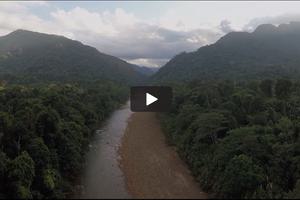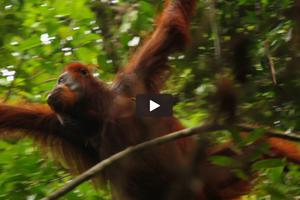In recent decades, the indigenous Tacana and Lecos people of northwestern Bolivia have faced increasing development pressure in their Amazon homelands as road construction has brought outside colonizers and logging operations, both legal and illegal. But working with international groups such as the Wildlife Conservation Society, the Tacana and Lecos have gained control over their territories — which together cover 3,500 square miles — and instituted a comprehensive system of resource management that has sharply reduced forest loss.
The second-place winner in the 2017 Yale Environment 360 Video Contest describes how the Tacana and Lecos communities, which have a total population of 6,700, have provided sustainable livelihoods by developing small-scale agriculture, including coffee and cacao plantations; promoting ecotourism; allowing limited logging; and effectively managing rainforest and rivers for hunting and fishing. As the 9-minute video by directors Robert Wallace, Lilian Painter, and Elvira Salinas explains, these controls have resulted in a deforestation rate four times lower than surrounding regions.
“Territorial management has been crucial in the face of the development and new settlements that threaten our territory,” says Tacana official Neide Cartagena. “[It] has served to protect and continue to maintain our Tacana way of life.”
About the Filmmakers: Lilian Painter and Robert Wallace are conservation practitioners focusing on developing indigenous capacity for management of ancestral lands. Elvira Salinas works with conservation communication to inspire urban populations to support local conservation efforts. Together they have led a team to document indigenous territorial management by the Lecos and Tacana people.
The Struggle to Quench Cuba’s Thirst
The third-place winner in the 2017 Yale Environment 360 video contest depicts how crumbling infrastructure, exacerbated by drought, has left some residents of Havana struggling to gain access to clean water.
After more than a half-century of Communist rule and a U.S. trade embargo, Cuba often looks like a nation frozen in time, as evidenced by the many vintage automobiles plying the country’s roads. But cars aren’t the only aspect of life stuck in a time warp. So is the country’s water infrastructure, much of which is in decrepit shape, leading to massive losses through leaks.
This chronic problem is now being exacerbated by a six-year drought affecting most of the country’s 168 municipalities. The video, “Waiting for Water” — the third-place winner in the 2017 Yale Environment 360 Video Contest — examines the water woes facing the 2.1 million residents of Havana, where some people lack running water and must rely on neighborhood wells or deliveries from water tanker trucks known as pipas.
“Cuban life is very hard,” says one Havana resident who uses buckets to haul well water to his house. “There are a lot of sacrifices, a lot of problems. We will keep waiting and waiting … like so many Cubans wait. We are just surviving with what we can.”
About the Filmmaker: Andrea Cornejo is a photojournalist and a documentary filmmaker in Florida. She is also a student at the University of Florida. Her video was a part of the UF College of Journalism and Communications’ multimedia storytelling project in Cuba.
About the contest: These two videos are runners-up in the 2017 Yale Environment 360 Video Contest and will receive prizes of $500 each. The first-place winner, “The Burning of Borneo’s Peat Swamp Forest,” received a $2,000 prize. Entries were received from five continents.

